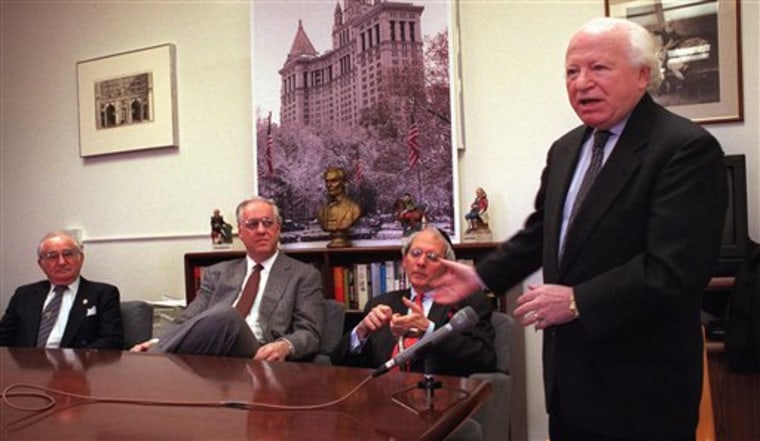Benjamin Meed, who escaped the Warsaw Ghetto and went on to help reunite survivors and establish a national Holocaust registry and two museums, has died. He was 88.
Meed died at his Manhattan home on Tuesday following a long illness, according to the American Gathering of Jewish Holocaust Survivors, which he helped found in 1981 and led at the time of his death.
The American Gathering's first meeting in Israel attracted 10,000 Holocaust survivors. The second, in Washington, drew double that number.
The American Gathering urged President Reagan in 1985 not to lay a wreath at the German cemetery of Bitburg, where the Waffen SS were buried.
Meed and his wife, Vladka Meed, also established a national registry in 1981 to document the lives of Jewish survivors who came to the United States after World War II, and help them search for relatives and friends.
Meed helped create two major Holocaust museums, the United States Holocaust Memorial Museum in Washington in 1983 and the Museum of Jewish Heritage — A Living Memorial to the Holocaust in New York in 1997. The registry is housed in the Washington museum.
A Warsaw Ghetto survivor and slave laborer during World War II, Meed was born Benjamin Miedzyrzecki in Warsaw in 1918.
He joined the underground in the months leading up to the 1943 Warsaw Ghetto uprising, the first armed civilian rebellion against the German occupiers in Europe. The roughly 1,000 Jewish fighters held out for nearly four weeks.
Assuming the identity of a gentile, Meed helped get his future wife out of the ghetto and helped smuggle Jews from the ghetto through the city's sewers.
He married Feigele Peltel in 1945. A year later, they immigrated to New York, where he started an import-export business and she wrote for the Forward. They officially changed their names to Benjamin and Vladka Meed in the 1950s.
Hailed for ‘an enormous legacy’
Meed also served on the advisory board of the President's Commission on the Holocaust, which recommended establishing the Holocaust Memorial Museum in Washington, and was on the memorial's governing council from 1980 to 2004.
Meed "left an enormous legacy to the world not just to survivors, but to the entire world," said Arthur Berger, a senior adviser to the Washington museum.
"His passing is a poignant reminder that the survivor community is getting smaller and smaller," said David Marwell, director of the Museum of Jewish Heritage.
He is survived by his wife and their two children, Steven Meed of Manhattan and Anna Scherzer of Paradise Valley, Ariz.; a sister, Genia Reznic of Tel Aviv; and five grandchildren.
A funeral service was scheduled for Friday in New York.
